One of a kind on the North Shore
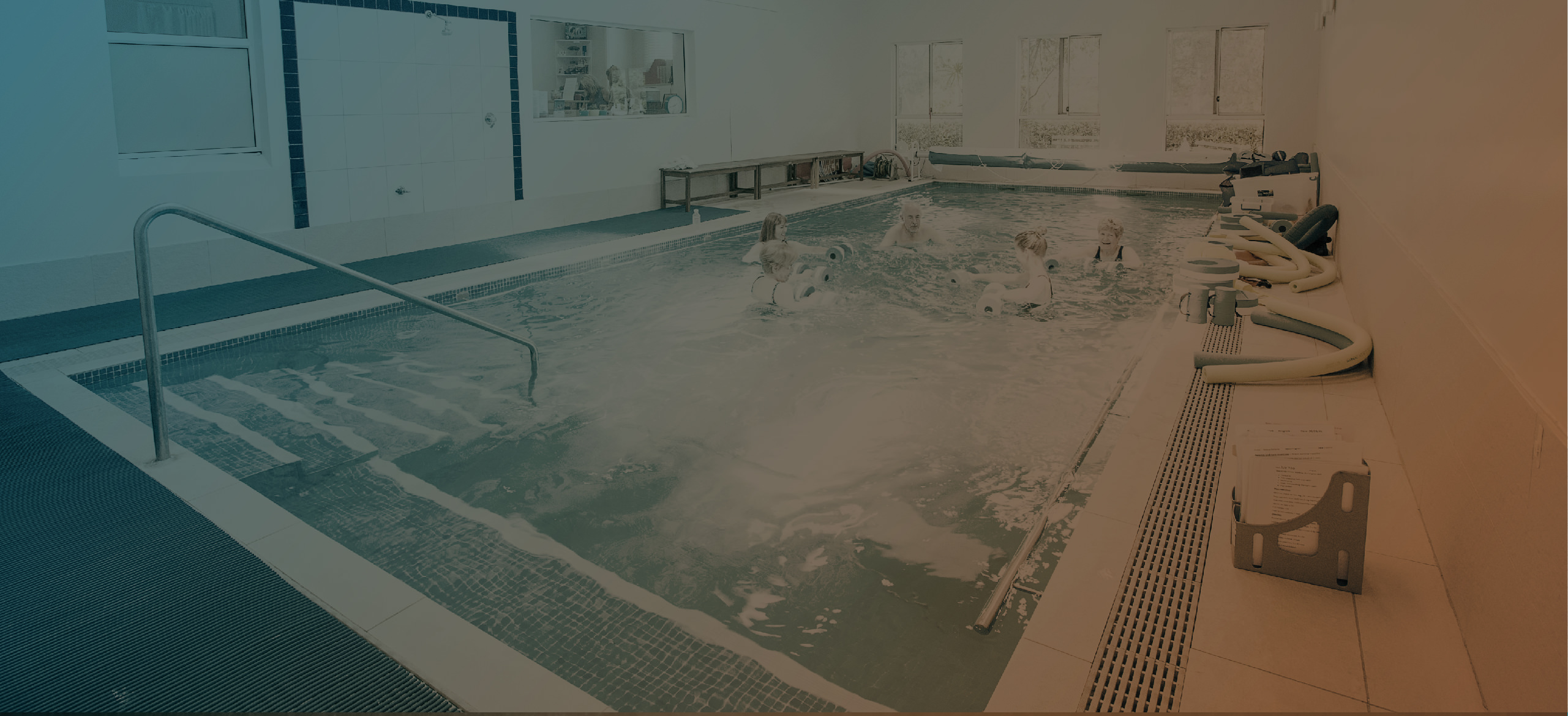
Aquatic Physiotherapy
One of a kind on the North Shore
Aquatic therapy is perfect for:
- Orthopaedic rehabilitation
- Joint replacement surgery (hip, knee, shoulder)
- Arthritic conditions (rheumatoid arthritis, osteoarthritis, ankylosing spondylitis)
- Back and neck pain
- Weight loss/Obesity
- Pregnancy fitness and aquanatal classes
- Chronic pain suffers
- Sports injuries
- Cardiac rehabilitation
- Aerobic fitness
- Elderly patients with decreased mobility
- Hydrotherapy for burns
Hydrotherapy in Sydney is closer than you think.
Lane Cove’s Hydrotherapy pool located just out of Sydney on the North Shore is quieter than many other Sydney Hydrotherapy pools and you’ll never find it as busy as Cook and Phillip pool.
The water in the pool is warm and heated to a comfortable and functional 34°C. The pool has a shallow end starting at 1m with a gradual increase in depth to 1.3m. It also has a smaller deep section of 1.6m. There are grab hand rails along the sides of the pool. It is essentially a chemical free pool using a bioniser filtration system to ensure a pleasant experience without a chlorine smell.
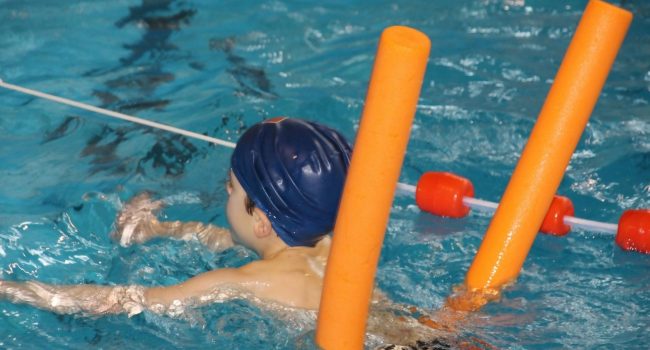
HOW ARE AQUATIC THERAPY SESSIONS STRUCTURED?
Depending on your fitness level, ability in the water or nature of your injuries, there are two ways your physio will take you through your aquatic therapy session.
Guided Aquatic Physiotherapy Session
During this session the physiotherapist will be conducting you directly through your program. If this is your first Hydrotherapy session or you are uncomfortable in the water or with the exercises, your physio will be in the pool with you. This involves showing you all of the exercises, teaching you how to use the pool exercise equipment and utilising physiotherapy techniques whilst you are in the water.
Self Directed Hydrotherapy
During this session you physio will be supervising you doing your program and using the pool exercise equipment. It is expected that you will have adequate knowledge and pool skills to be able to be self-directed in your program.
A 30 MINUTE AQUATIC PHYSIOTHERAPY CONSULTATION INVOLVES
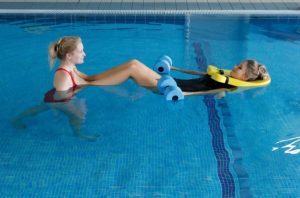 Before your physio takes you for your first Aquatic Therapy session, you will be taken through a thorough land based clinical assessment in order to identify any weaknesses and identify your goals. Your hydro physio will then cover any contraindications and go over any precautions before explaining how the pool operates. The physiotherapist will then guide you through your aquatic physiotherapy session and a number of techniques, teaching and showing you how to properly perform the exercises, and how to use the pool exercise equipment safely. Once you learnt how to do all the exercises safely and feel more comfortable, you will be able to undergo self-directed sessions and utilise the hydrotherapy facility at a reduced rate.
Before your physio takes you for your first Aquatic Therapy session, you will be taken through a thorough land based clinical assessment in order to identify any weaknesses and identify your goals. Your hydro physio will then cover any contraindications and go over any precautions before explaining how the pool operates. The physiotherapist will then guide you through your aquatic physiotherapy session and a number of techniques, teaching and showing you how to properly perform the exercises, and how to use the pool exercise equipment safely. Once you learnt how to do all the exercises safely and feel more comfortable, you will be able to undergo self-directed sessions and utilise the hydrotherapy facility at a reduced rate.
Benefits of Aquatic Physiotherapy:
- Supportive environment in which to exercise
- Resistance of water to help build up strength
- Warm water reduces muscle pain, spasm and joint stiffness
- Buoyancy of water reducing pressure on joints
- Reduced fear of falling
- Greater improvements in function compared to land based exercise
- Significant changes in balance and coordination
- Enhancements in quality of life
- Relaxed and fun atmosphere
Aquatic Physiotherapy is not suitable for people with:
- Wound or skin infections
- Gastric virus
- Raised temperature
- High or low blood pressure
- Breathing difficulties
- Heart problems
- Incontinence
- Chest infections
WHAT IS HYDROTHERAPY?
Put simply, Hydrotherapy is the use of water as a treatment or therapy designed to promote physical wellbeing. There are a number of different water temperatures in the Hydrotherapy Pools in Sydney but the water in Lane Cove’s hydrotherapy pool is specifically heated to 34 degrees Celsius. This helps to increase circulation and blood flow throughout the body, helping to activate areas of the brain that help to dampen pain signals to the brain.
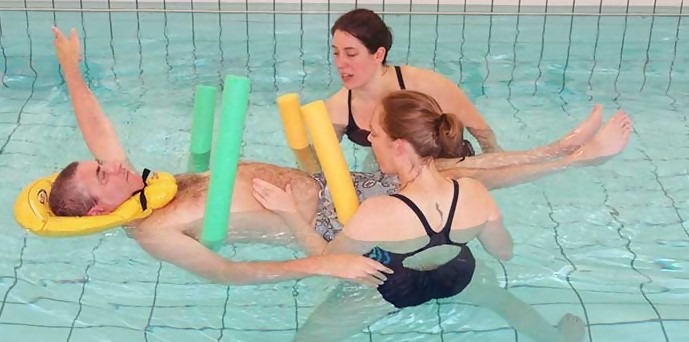
Using water in different ways and at various temperatures will cause different effects on different systems of the body. Hydrotherapy has been shown to increase blood circulation, including circulation of the white blood cells, aiding recovery and lowering markers of delayed onset muscles soreness (DOMS). Hydrotherapy also increases the body’s production of endorphins which in turn helps to strengthen the immune system, reduce inflammation, heal injured tissue, improve well-being and energise the body. Hydrotherapy helps heal injured tissue by supplying fresh nutrients and oxygen to the extremities and helps with the removal of waste products. Heat causes surface blood vessels to dilate or expand and studies have shown that water immersion at 34°C lowers the heart rate and systolic and diastolic blood pressure while increasing markers of muscular repair.
- Change rooms with showers
- Disabled changing facilities
- Step access with rail
- Surrounding grab rails
- 10m x 5m total size
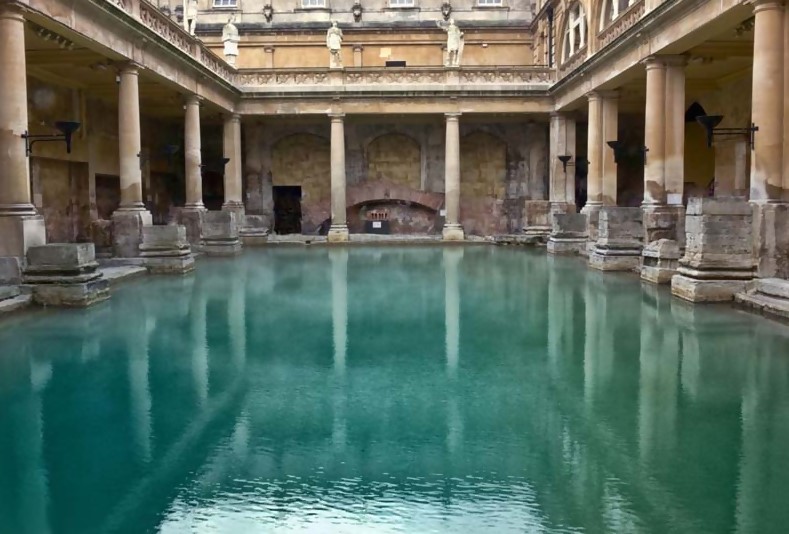
WHAT ARE THE BENEFITS OF AQUATIC PHYSIOTHERAPY?
If you’ve ever wondered exactly what goes on behind closed doors during a Hydrotherapy Centre (or Aquatic Therapy) session, you’re not alone. Even though Hydrotherapy has been practiced by everyone from the Egyptians to the Greeks since at least the 5th Century, most people aren’t fully aware of the myriad of benefits aquatic physiotherapy can have on all kinds of pains and ailments. When run by an expert physiotherapist, a session in the Hydrotherapy pool can be great for arthritic conditions, rehabilitation, reducing chronic pain and even neurological rehabilitation.
Since the 5th Century, scientists, physicians and physiotherapists have been studying and refining hundreds of different methods, Aquatic Therapy techniques and exercises that are designed to target specific areas of the body and painful problems. Today, physiotherapists use hydrotherapy to treat conditions such as cerebral palsy, osteoporosis, Fibromyalgia, muscular pain and most orthopaedic surgeries such as a knee replacement, hip replacement and shoulder rotator cuff repair surgeries. Lane Cove physio also specialises in aqua natal classes designed to use aquatic therapy techniques during and after pregnancy. The warmth of the water makes Hydrotherapy especially suited to treating and soothing arthritis pain and inflammation.
FREQUENTLY ASKED QUESTIONS
WHAT DO I BRING TO MY FIRST SESSION?
- Bring bathers and a towel (wear your bathers underneath your clothes so it is easier to get changed for the pool session)
- Water bottle for refreshment
- Your physio will guide you to the change room and pool area where you will begin your first aquatic physiotherapy session
IS HYDROTHERAPY JUST AQUA AEROBICS?
No. Hydrotherapy and Aquatic Therapy sessions may involve aerobic exercise depending on your condition and treatment plan but a Hydrotherapy pool is for much more than simple aqua aerobics.
HOW DO I KNOW IF I NEED AQUATIC THERAPY?
As a general rule, if you have movement difficulties or pain during movement, problems with your balance or mobility, or find exercising on land challenging then aquatic physiotherapy is generally a good thing to try. Aquatic Therapy is also perfect if you would like to re-learn to swim after an injury or want to work on your fitness after a period of inactivity. Speaking to your physiotherapist and having an in depth consultation with them about whether hydrotherapy or aquatic physiotherapy is a good option for you is the next best step.
CAN YOU LOSE WEIGHT WITH HYDROTHERAPY?
Aquatic therapy has been shown to be beneficial for individuals who need to lose weight, who find other forms of physical therapy and exercise difficult due to an accompanying injury, lack of flexibility pain. Research by the University of Virginia has also shown that running in water is capable of burning up to 40% more calories per minute than running on land. Water has more resistance than air, making your body work harder, while the extra buoyancy and balance makes it safer to engage in exercises you might not normally be able to on land.
HOW DOES HYDROTHERAPY HELP ARTHRITIS AND JOINT PAIN?
There are over 100 different forms of arthritis and Hydrotherapy and Aquatic Therapy have been shown to be beneficial in treating a number of them. Aquatic therapy is an excellent way for those suffering from arthritis to build strength, ease stiff joints and relax sore muscles using the 34 degree water’s buoyancy to greatly reduce the pressure on your joints, making it easier to perform a variety of range of motion exercises.
IS HYDROTHERAPY SAFE FOR CHILDREN?
At Lane Cove Physio our specialist aquatic therapy Physiotherapists are able to offer comprehensive and perfectly safe treatments designed to meet the individual needs of your child. Hydrotherapy is one of the more advanced treatments we offer and can be used to treat many symptoms and conditions when used in the right way. All of our Hydrotherapy specialist physios are experts in designing and running hydrotherapy programs for children. As with any program, your physiotherapist will first complete an in-depth assessment on dry land to diagnose any problems or contraindications, plan the treatment and to evaluate your child’s suitability and safety within the pool.
WHERE IS THE HYDROTHERAPY POOL?
 The hydrotherapy pool is conveniently located in our physiotherapy centre. It is on the corner of Longueville Road and River Road West, 237 Longueville Road. There is easy parking on Longueville Road and in surrounding side streets. Less able patients are able to use the driveway at the Centre.
The hydrotherapy pool is conveniently located in our physiotherapy centre. It is on the corner of Longueville Road and River Road West, 237 Longueville Road. There is easy parking on Longueville Road and in surrounding side streets. Less able patients are able to use the driveway at the Centre.
CAN I GET A REBATE FOR MY AQUATIC THERAPY SESSION?
Health Rebates are available for pool sessions for private patients. You do not need a referral. DVA, Workcover and Third Party are covered by their insurance and need a referral by their local G.P.
For more information about Hydrotherapy in Sydney, please don’t hesitate to contact our friendly staff at Lane Cove physio on 02 9428 5772 or come on down and check it out for yourself.


